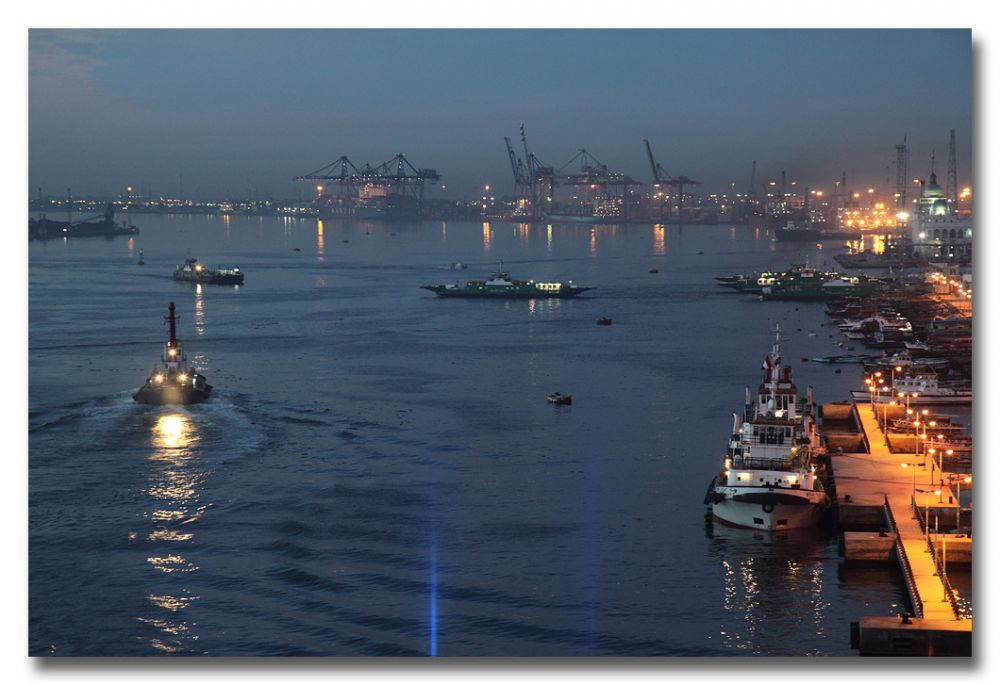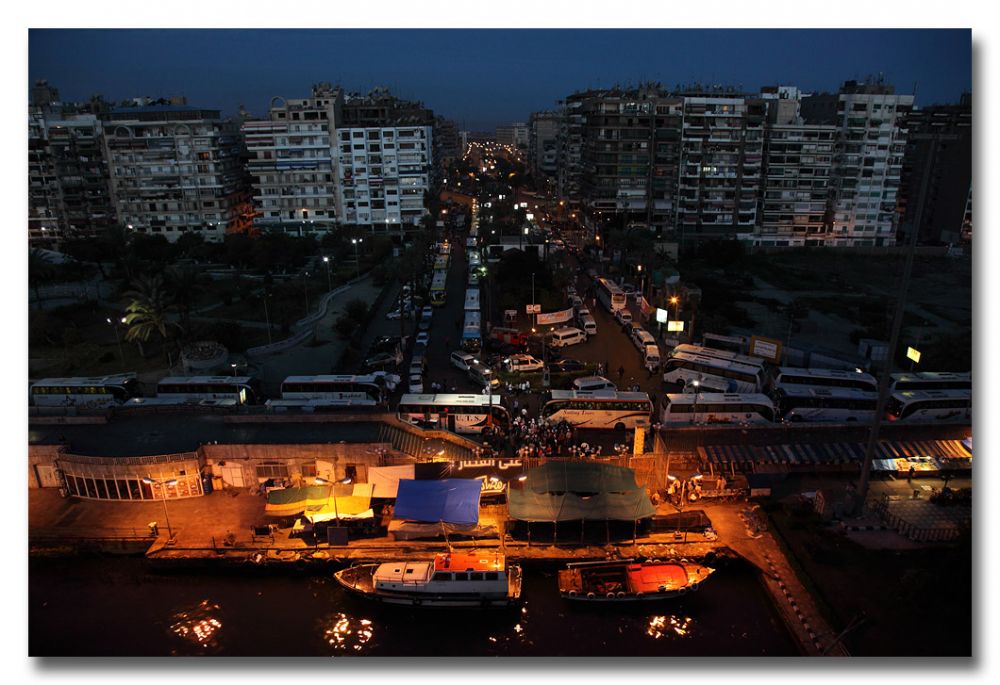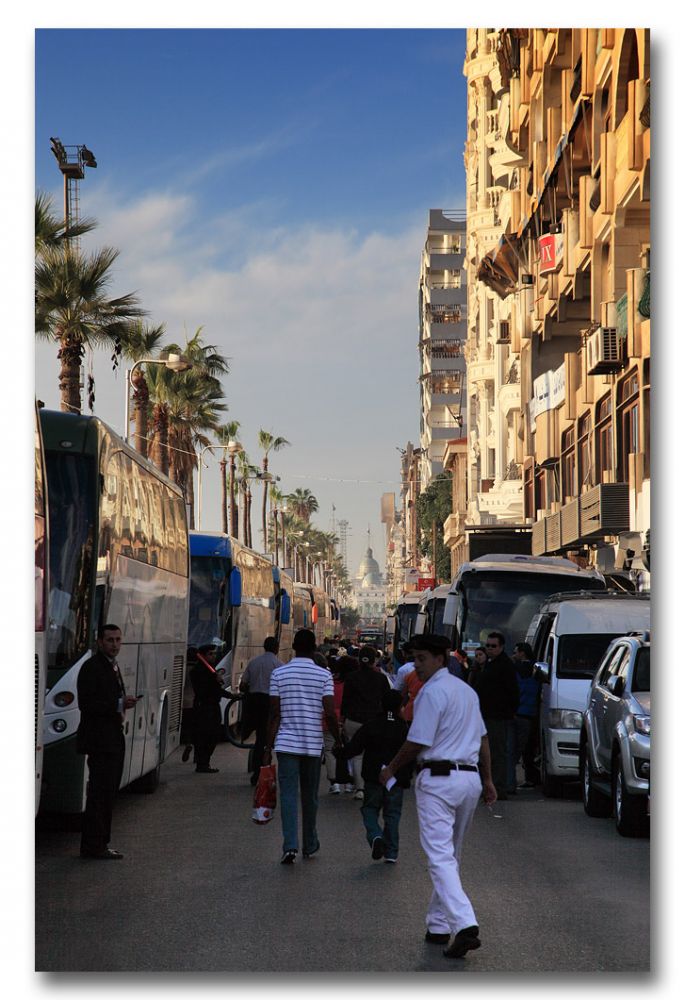The harbor sprang to life as Norwegian Sun pulled into Port Said at dawn. An endless line of tour buses were waiting along a narrow street by the pier. Perpendicular to the pier was a thoroughfare stretching far into the heart of the city and beyond. A steady stream of people was being disgorged from the starboard side of our humongous ship and inching its way toward the buses as I stood high above on Deck 15 trying desperately to steady my camera against the tremor sent through the ship by its idling engine and snap a few pictures of my first view of Egypt soaked in the shimmering twilight of morning.

Shrouded by the long shadows of moored gargantuan vessels, little boats of all sorts were toiling around on the rippling surface of dark water.
In the dim halo of street lamps flanking the thoroughfare could be seen police vehicles dotting both sides of the road and people standing by those vehicles kept the surrounding areas under their watchful eyes. Such was my first sight of Egypt, ominous, ghostly, evoking the underworld. I didn't realize it then, but looking back, that scene of tight security should have alerted me that this was going to be a tour unlike any I had taken before.

We were in no particular hurry as Blue Nile was supposed to have a minivan waiting down there for us, and as all those countless buses and minivans had to get loaded with tourists first and then organized into a police-guarded convoy for the 3-hour drive to Cairo. Over the years, terrorists have attacked tourists in Egypt on a number of occasions. The most gruesome attack happened on November 17, 1997, when 62 people, mostly tourists, were killed by terrorists in Luxor. The protected convoy arrangement is in response to such threat.
After finishing a leisurely breakfast, we strolled down to Deck 4, with a piece of luggage each, to disembark. It was fully bright by now.

It did not take us long to find Nile Blue's minivan parked on the right hand side of the street; it had “Nile Blue” painted on its side panels and a cleanly shaven young man standing by its passenger side door. He looked in his late 20s, of a stocky build with a budding beer belly. All smiles, he was sporting a loosely fitting black hoodie and a pair of denim jeans, and was holding up a cardboard sign saying “Nile Blue”.
“My name is Mo'men”, the young man was saying to us as we gathered around him. “It sounds like “moment” in English, so you can call me Moment. It'll be a while yet before the convoy can leave.” I was just about to tune him out and step away to look around the harbor when he said something that alarmed me: “The drive to Cairo will take a bit over three hours, and we won't be able to make stops on the way as the convoy must stay together at all times.” More than three hours without stops?! Well, that's going to be a problem, I thought to myself, a big problem, for my bladder! “So, what if we need to go to the bathroom”? I asked. “Well, you'll just have to hold your pee”, Mo'men replied matter-of-factly. Here is a bit of hindsight I had after we got to Cairo: if he hadn't told us there were no planned stops on the way, I might probably have been just fine; now that he had put us on notice, however, I couldn't help but start dreading what to do when nature called. As a matter of fact, I immediately felt the need to take a leak upon hearing Mo'men's unpleasant announcement.

Truth be told, I felt a bit put off by Mo'men's reply. We've been to places around the world. No matter where we are, we invariably find people to be accommodating when it comes to tourists' reasonable, expected needs. It is not uncommon either for people to even go out of their way to offer help. I was taken aback by Mo'men's response because, just a moment before I popped the question, he had been saying how happy he was to see us and how his personal living as well as the health of the Egyptian economy both heavily depended on tourism. I can't even chalk it up to inexperience, as Mo'men later revealed that he had been employed in the tourism industry for years, ever since graduation from college. In my urge to rationalize everything, I did manage to find an excuse for Mo'men: our vehicle needed to stay with the convoy at all times for security reasons. But this does not explain why arrangements couldn't have been made for the entire convoy to make at least one stop somewhere along the way.

Long story short, I went to the bathroom three times during the one hour we waited for departure at the harbor just so I wouldn't have to cause some embarrassing international incident because I needed to pee.
I did manage to survey the harbor a bit in between. The street the Nile Blue van was parked on was flanked on one side by an endless row of nondescript one-storey buildings housing what looked like warehouses and waterfront stores and on the other side by apartment buildings of different heights and sizes. At the end of the street stood a glistening mosque topped with light green domes, reminding us unequivocally we were in a land of Muslims.
Indeed, most conspicuous amid an assortment of constructions lining the opposite side of the harbor was another majestic mosque, its twin minarets, meticulously sculptured, towering in sharp contrast next to a crowd of colossal portal cranes of ruthless functional design, a mesmerizing ode to history in symphony with a barbarian shout of modernity, beauty and the beast, the two sides of the same coin called Egypt. All that's there left to do is figure out which is the heads, and which the tails.





